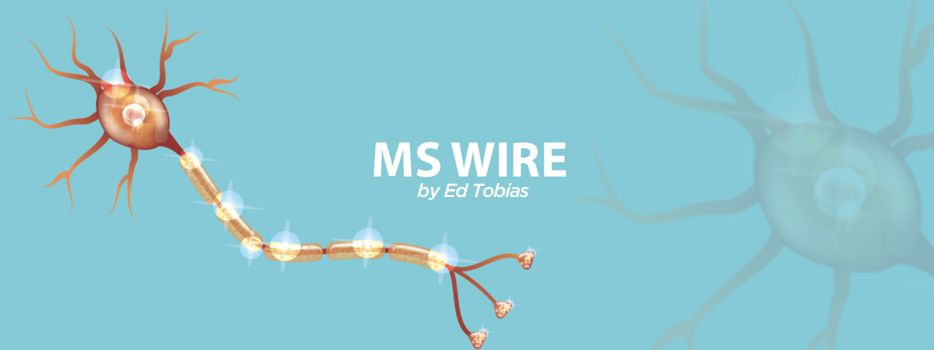MS News That Caught My Eye Last Week: Possible MS Blood Test, IMU-838, aHSCT vs. Lemtrada
Written by |

Neurofilament Light Levels at First MS Event Can Predict Long-term Brain Atrophy
Researchers are looking at a protein that’s released into the body’s fluids when neurons become damaged. They hope it will help them predict — as far as 10 years down the road from the first indication of multiple sclerosis — how much a person’s brain is likely to shrink.
This seems like a big deal. The ability to use a simple test to impress upon someone how severe their MS might be — at the beginning of doctor’s consultations — might encourage more people to seek early treatment. And I believe early treatment is one of the keys to limiting disease progress.
The levels of the protein neurofilament light chain (NfL) in the blood when a person experiences a first demyelinating event associated with multiple sclerosis (MS) can predict brain atrophy up to a decade later, a new study shows.
Titled “Association of Serum Neurofilament Light Levels With Long-term Brain Atrophy in Patients With a First Multiple Sclerosis Episode,” the study was published in JAMA Network Open. The study was sponsored by Biogen.
Click here to read the full story.
***
Additional Group of RRMS Patients Sought to Take Lower Dose of IMU-838 in Phase 2 Trial
I was a test subject in the Phase 3 trial of Avonex (interferon beta-1a) around 1995, and I’m always on the lookout for trials of new disease-modifying therapies for MS. Where would we be without them? But it’s not always easy to find volunteers.
IMU-838, a daily pill, is reported to be both safe and effective at attacking lesions in the brain. Unfortunately, the study is only being conducted at several sites in Eastern Europe. If that’s where you live and you’d like to volunteer, our story contains contact information.
Immunic Therapeutics is seeking 60 more adults with relapsing-remitting multiple sclerosis (RRMS) to test a lower dose of IMU-838, its leading oral experimental therapy, in its ongoing Phase 2 EMPhASIS trial.
The decision was based on previous trial results showing that both doses tested (30 and 45 mg per day) appeared to be equally safe and effective at lowering the number of brain lesions in RRMS patients, supporting the use of the lower dose in a future Phase 3 clinical trial.
Click here to read the full story.
***
Bone Marrow Transplant Most Useful for Younger Patients, MS Society Experts Suggest
There’s no surprise here. The prevailing wisdom, at least for the past few years, has been that disease-modifying therapies work best when a patient is young. Why should it be any different for bone marrow transplants? This article is based on the revised stem cell transplant guidelines released earlier this month by the National Multiple Sclerosis Society. I wrote a column about it a few weeks ago. Even so, I’m highlighting this story because of its high interest.
A bone marrow transplant may be particularly useful for those with relapsing forms of multiple sclerosis (MS) who, despite treatment with high-efficacy disease-modifying therapies (DMTs), continue to experience relapses or show signs of new lesions, experts say.
According to new recommendations from the National Multiple Sclerosis Society, those under 50 who were diagnosed with MS within the last 10 years are likely the best candidates for the procedure. Society MS experts also emphasized that the transplant should only be carried out at specialized centers by experts in the field.
Click here to read the full story.
***
Stem Cell Transplant More Effective Than Lemtrada in Treating RRMS, Study Suggests
Lemtrada (alemtuzumab) is sometimes called “stem cell light.” As with stem cell transplants, Lemtrada uses a form of chemotherapy to kill off much of a patient’s immune system. When the immune system rebuilds itself, it’s hoped that it will return without the rogue cells that trigger MS. There are risks and benefits to each treatment outlined in this study. Which treatment would you choose?
An autologous hematopoietic stem cell transplant (aHSCT) is more effective than Lemtrada (alemtuzumab) at achieving no evidence of disease activity and preventing relapses in people with relapsing-remitting multiple sclerosis (RRMS), a real-life study in Sweden reported. …
These findings suggest that RRMS patients willing to accept aHSCT’s side effects, especially in the short term, may benefit more from this one-time treatment approach than the more conventional approach of Lemtrada, the researchers noted.
***
Note: Multiple Sclerosis News Today is strictly a news and information website about the disease. It does not provide medical advice, diagnosis, or treatment. This content is not intended to be a substitute for professional medical advice, diagnosis, or treatment. Always seek the advice of your physician or other qualified health provider with any questions you may have regarding a medical condition. Never disregard professional medical advice or delay in seeking it because of something you have read on this website. The opinions expressed in this column are not those of Multiple Sclerosis News Today or its parent company, Bionews, and are intended to spark discussion about issues pertaining to multiple sclerosis.



Leave a comment
Fill in the required fields to post. Your email address will not be published.